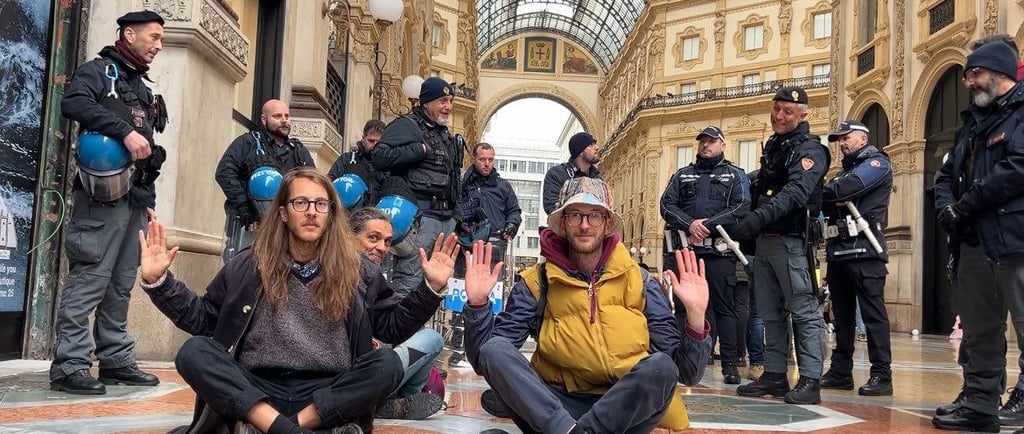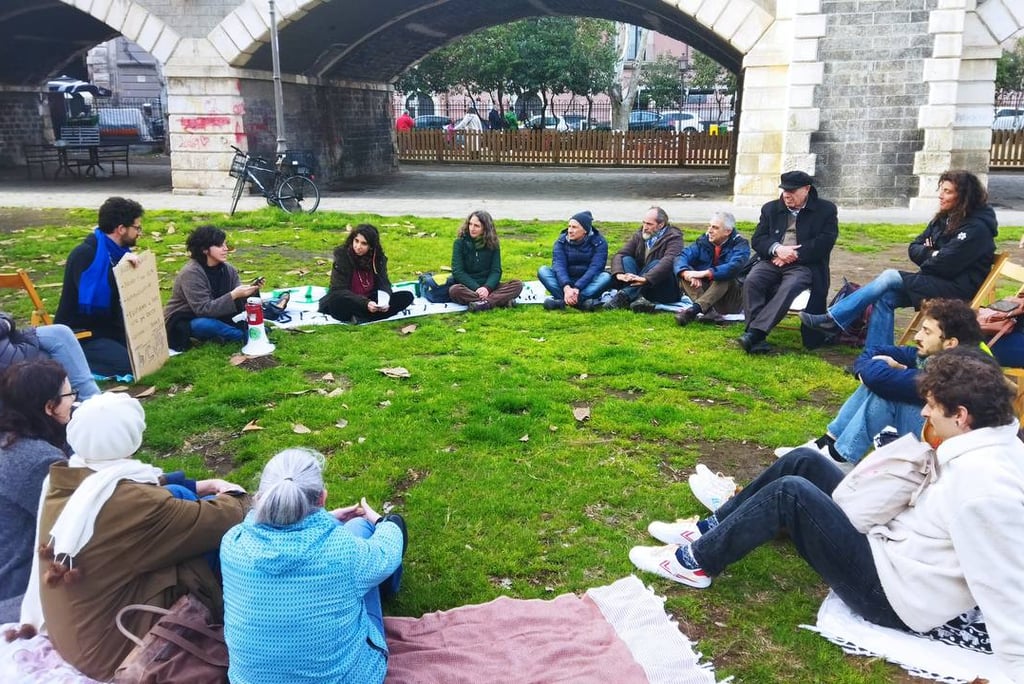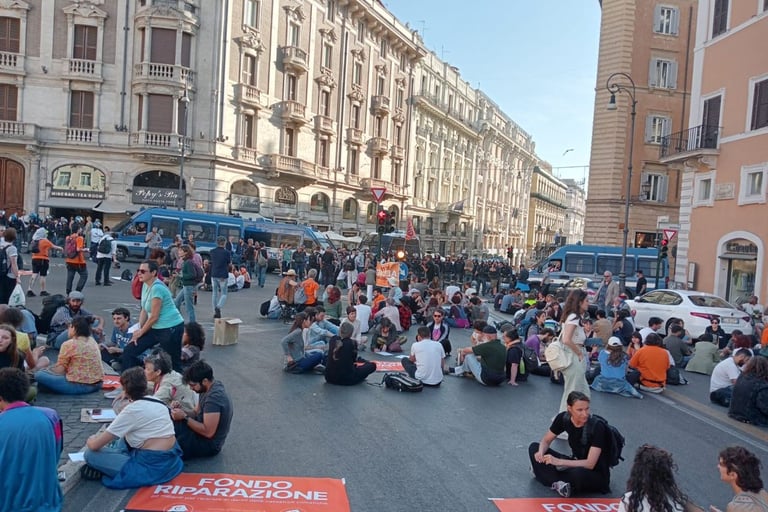Resilient Uprising: A Global Vision for the Future
The article presents Resilient Uprising as a global movement rooted in the history of failed yet persistent struggles for justice, emphasizing resilience, adaptation, and long-term commitment over short-term victories. It outlines three core priorities: enabling global freedom of movement to address demographic and justice imbalances, experimenting with diverse democratic models tailored to local contexts, and building systems of mutual support among global movements. Ultimately, it calls for an organized, international effort to challenge entrenched power structures and construct a more just, democratic, and united future.


At the crossroads of despair and possibility, we must recall the pivotal moments of collective determination. After years of resistance, facing setbacks and seemingly insurmountable challenges, it would have been easy to let the weight of failure dictate our course. Yet, instead of succumbing to defeat, we chose to rise again, failure after failure, fueled by a belief in change that transcends immediate outcomes.
In the aftermath of failed attempts to topple oppressive regimes, it is tempting to view such defeats as final. However, those who have fought for justice and freedom know that failure is not a signal to retreat but an opportunity to refine, regroup, and re-envision our approach to resistance. Whether it was the peaceful revolutions in Eastern Europe, the struggles of the African National Congress in South Africa, or the enduring spirit of the people in the streets of Myanmar, we have seen time and again that movements can endure, adapt, and grow stronger in the face of hardship.
“We did not stop because we failed. We stopped to reimagine our methods, to learn from our mistakes, and to prepare for a fight that would last longer but could not be lost. It wasn’t just about removing a dictator or dismantling an unjust system; it was about building the resilience to carry on until change came. It was about ensuring that every step, every setback, and every triumph added to the foundation of something much larger than ourselves”
Ivan Marovic
This is the essence of Resilient Uprising — a movement born from the ashes of past revolutions, and a commitment to persistence, hope, and collective action. We draw from the strength of our shared will, where setbacks do not define us but only sharpen our resolve. This movement is not simply about winning battles in the short term, but about building long-term infrastructure capable of withstanding the trials of resistance.
Consider the example of the Indian independence movement, where leaders like Mahatma Gandhi endured years of struggle, facing setbacks and intense repression from the British colonial powers. Despite these hardships, the movement remained steadfast, rooted in nonviolence and perseverance, ultimately leading to India's independence. Similarly, the Civil Rights Movement in the United States faced brutal opposition, but its leaders and supporters held fast to their belief in justice, leading to monumental changes in laws and social attitudes.
In our current world, where oppression often transcends borders, our resilience takes on a global form. The forces we are up against are no longer just national; they are systemic, international, and interconnected. Dictatorship, exploitation, and inequality do not stop at borders, and neither should our movement. To truly dismantle these forces, we must come together across borders, learning from each other’s struggles and forging a united front that is as adaptable as it is relentless.
As we look to the future, we can draw strength from the knowledge that others, too, have faced seemingly insurmountable odds and emerged stronger. From the Velvet Revolution in Czechoslovakia, where millions defied Soviet-backed totalitarianism with peaceful protests, to the Arab Spring uprisings, where people from Tunisia to Egypt to Syria rose in the face of brutal repression, these movements remind us that even after the darkest of days, there is light on the horizon.
Our fight is not just for today; it is for tomorrow and for the generations to come. We are committed not just to dismantling the systems of oppression, but to building something new, something that will endure. This is the promise of the Resilient Uprising — that no matter how many times we fall, we will rise again. Together, we will stand tall, united by our shared belief in a better world, and we will continue the work until that world is ours.
For Resilient Uprising to succeed, we must address the most pressing challenges of our time — those that transcend national boundaries and demand coordinated, global action.
The first challenge we face is the growing divide between the older, entrenched powers in the West and the younger, more dynamic populations in the Global South. In the face of climate change, economic disparity, and shifting power dynamics, it is crucial that we enable the free movement of people — particularly from African and Asian countries — to Western democracies. These nations must open their borders, granting equal rights and opportunities to populations displaced by conflict, economic collapse, and environmental disasters.
The reality is that as older populations in Western countries grow cold and entrenched in their privileges, younger, more hopeful generations in the Global South are pushing forward, seeking opportunities to live free and dignified lives. It is essential for the future of democracy and global justice that we enable these populations to move freely, contribute to global societies, and live full, productive lives.
“This is not just a humanitarian necessity; it is an imperative for the survival of democracy. If we don’t create a world where the youth of the South can thrive, we risk seeing the old systems of power revert to violence and repression to protect their privileges.”
Michele Giuli
This calls for Resilient Uprising to become an international movement, one that connects efforts across continents. We must strengthen the global solidarity between peoples and challenge the power structures that prevent mobility, economic growth, and human dignity. This challenge compels us to be coordinated, organized, and united in our fight for freedom and equality across all borders.
The second major priority for Resilient Uprising is the experimentation with and implementation of diverse forms of democracy. As we look ahead, it’s clear that a one-size-fits-all model of democracy will not work. Every nation, every region, has its own unique history, challenges, and cultural context. What we need is a flexible framework that allows us to explore different democratic structures — structures that are decentralized, that allow for local autonomy, and that place the power back in the hands of the people.
This is not an easy task. The forces of authoritarianism, capital, and military power are pushing back against democratic movements, and there is no single blueprint that can solve all of the world’s problems. What we need is a robust process of democratic experimentation, where we test new forms of governance, new methods of political organization, and new ways of sharing power.
“We must take bold steps to find the right formula for democracy. It may look different in every place, but the core principles of equality, freedom, and justice must be our guide.”
Jesper Lagerman
This leads to our third priority: the urgent need for mutual support among movements. As we seek to build a new global democracy, we must also build the systems of mutual support that allow us to stand in solidarity. This will involve supporting movements in wealthier nations to redistribute power and resources to those struggling in the Global South. We must ensure that movements in poorer regions are not left behind, and that there is a meaningful exchange of knowledge, resources, and leadership across borders.
In the context of international cooperation, mutual support, and democratic experimentation, we must also be prepared for the harsh reality of resistance. There will come a time when leaders and activists alike will face imprisonment for their efforts. It is an unfortunate but necessary consequence of challenging the status quo on a massive scale.
“This is not about radical tactics. It’s about effectiveness. If we are serious about challenging the systems of power that perpetuate inequality and oppression, we must be ready to face the consequences — even if that means going to prison. The more organized we are, the more likely this will be.”
Michele Giuli
This commitment to resistance, to standing firm in the face of adversity, is what sets us apart. We are prepared not only to confront injustice but also to endure the hardships that come with it. Leadership in the 21st century will require individuals who are not just activists but revolutionaries willing to endure persecution for the cause.
Lastly, this vision is not abstract; it is a call to action. We must gather the leaders, thinkers, and change-makers from around the world to begin organizing, training, and planning. Our project will start with a year of intensive planning, where we will engage with leaders from various countries and continents to create the infrastructure necessary for a global movement.
We envision a future where our collective effort can spark a revolution of the people — one that will not only dismantle existing power structures but replace them with something better, more just, and more resilient.




